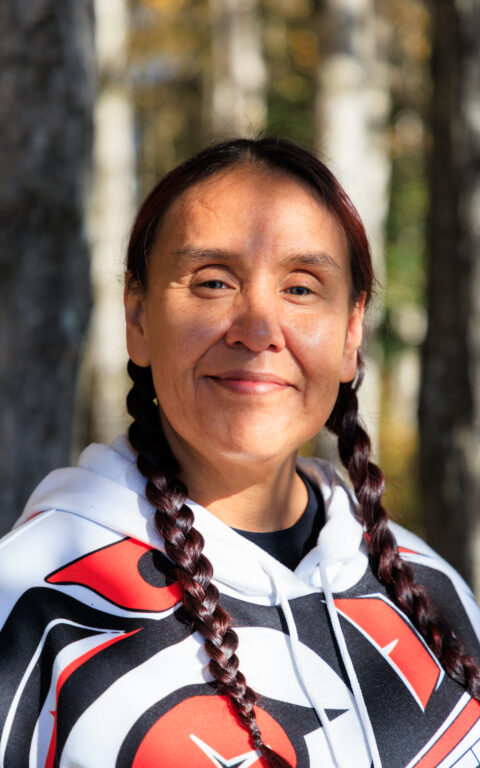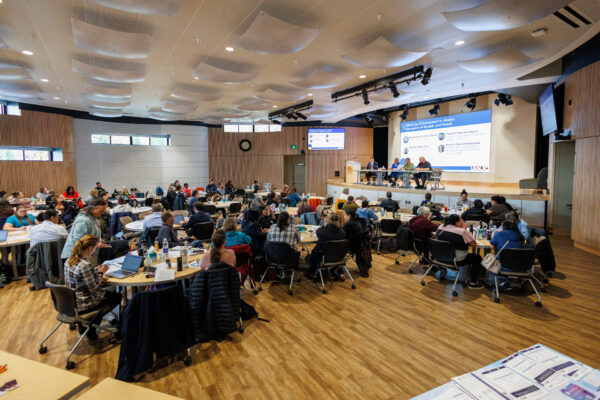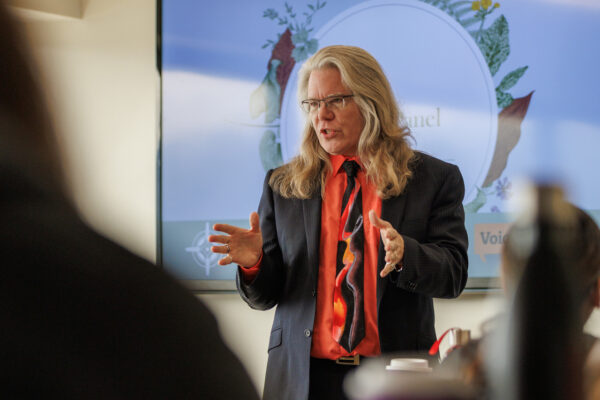Barrier crimes can keep individuals from working post-incarceration. But ANJC helps people like Maggie Fairbanks overcome those obstacles with employment-based variances.
Maggie Fairbanks was tired of running.
She’d spent her life dodging parole officers, going in and out of jail, living sofa to sofa, living in addiction. She had cut her ankle monitor off more than once. When she came up for sentencing yet again, the judge warned her: This was her last chance.
“I was a known runner. For them to grant me a transfer [into treatment for addiction] was a risk. But by then, I was so tired, I was just grateful for the chance,” Maggie recalled. “I ran with it, instead of running from it.”
She successfully completed treatment and immediately connected with Cook Inlet Tribal Council (CITC) for follow-up support and help finding employment.
Maggie wanted to use her experience to help others who struggle with addiction. She hoped to find a job as an addiction treatment counselor.
But her criminal record stood in the way.

Making the Impossible Seem Possible
Part of Haley Dampier’s job as a paralegal at the Alaska Native Justice Center (ANJC) involves assisting individuals like Maggie with applying for an employment-based variance. A variance is an exception to an individual’s criminal record, or findings in their child welfare case, that can be granted by the State to allow them to work for a specific employer.
Because Maggie wanted to work in the field of substance abuse treatment, she needed to apply for a variance.
“The variance program is really important for people in reentry because there aren’t a lot of programs for people coming out of jail. Even things we take for granted—like a good paying job with benefits—don’t seem like they’re possible,” said Haley.
Barriers to Employment
A good job isn’t just about survival; it’s about staying out of prison.
About 66 percent of Alaskans released from incarceration end up returning to prison, often because resources that make it possible for them to live soberly and independently aren’t available to them. According to the Journal of Community Safety & Well-being, only 37 percent of formerly incarcerated individuals in Alaska are engaged in full-time employment one year post-release.
For many individuals reentering the community, staying out of prison hinges on the stability provided by a job that offers a living wage, benefits, and a sense of fulfillment.
Especially as Anchorage experiences a labor shortage, the problem isn’t a lack of jobs. Some employers are unwilling to hire individuals with a criminal record, and some jobs—like the one Maggie sought—can’t be filled by the previously incarcerated without a variance.
Although the variance program opens a door to opportunity for previously incarcerated individuals, applying for this special exception can be a lengthy and often arduous process. Variance applicants have to share their criminal history with their prospective employer, do a background check, provide substance abuse treatment records, and demonstrate how they’ve overcome those barriers.

Setting People Up for Success
The sheer amount of paperwork can be overwhelming, especially for someone who is reentering the community after years in prison.
“The applicant really has to delve into some hard circumstances—sometimes into the worst times of their life,” Haley explained.
That’s why ANJC paralegals like Haley work through each step alongside individuals seeking a variance.
Haley conducts conversations with a person’s prospective employer, explaining the variance process and its compliance requirements; she helps references draft letters of recommendation for the individual applying for the variance. One of her biggest tasks is obtaining criminal and Office of Children’s Services records—sometimes submitting requests to courts multiple times to make sure an individual can access their own documents.
ANJC helps pay the fees for obtaining those records. The organization also assists with submitting all the paperwork and tracking deadlines for the variance process. Haley has even prepped people for interviews with the committee that ultimately decides whether to grant a variance.
“It’s why the state [variance] program exists—is to remove those barriers,” she said. “We need to set people up for success; we need to have more opportunities for people to rehabilitate themselves when they’re willing to put in the work.”

“We Keep What We Have by Giving It Away”
Maggie was willing. She worked closely with Haley to obtain a variance that would allow her to work at Genesis Recovery as a counselor-in-training. Though it was a long process, she was grateful for the support she received from ANJC, her treatment center, and even her parole officer.
“It was really nice to have a lot of people in my corner to help me work through it,” Maggie said.
“What stood out for me with Maggie was her initiative and how positive she remained,” Haley recalled. “And she’s done a lot of hard work since then; she’s shared about her recovery journey, and I think a lot of people found inspiration in that, because she’s since referred other variance applicants to us who have been approved.”
That was Maggie’s goal: To take her experience and use it to help others stay out of prison, achieve recovery—better their lives. Today, she is certified as a chemical dependency counselor and is employed at a treatment center. She regularly returns to CITC to share her story with individuals seeking recovery support.
“I feel like it’s part of my purpose, part of my testimony, and part of my recovery,” she said. “We keep what we have by giving it away. I feel like my story’s got a purpose, and that’s to also help people that are going through the same thing.”
Do you or someone you know require a variance to obtain employment? ANJC can help. Paralegals like Haley are available to assist with collecting documentation and completing employment-based and other variance applications, although the final outcome of variance applications is determined by the Alaska State Department of Health.
Your contribution to our Voices for Justice fundraiser supports people who are working toward a second chance. Consider a donation to ANJC.




